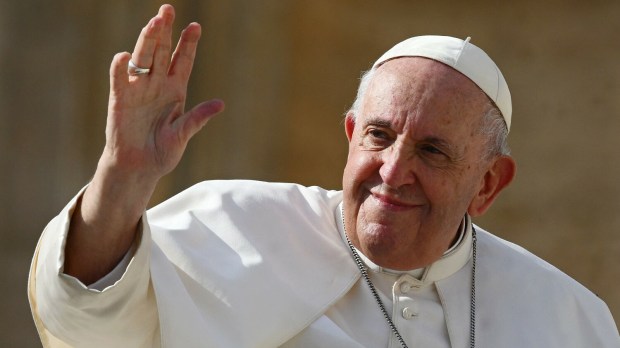As Pope Francis continues to teach us how to find God’s will in the midst of life — also known as discernment — on this October 26, he focused on “desolation” as an indicator of what God might be doing in our lives.
The Pope called on his spiritual father, St. Ignatius of Loyola, to give a definition of desolation:
Darkness of soul, disturbance in it, movement to things low and earthly, the unquiet of different agitations and temptations, moving to want of confidence, without hope, without love, when one finds oneself all lazy, tepid, sad and as if separated from his Creator and Lord.
The Holy Father suggested that “we all have experience of this.” But, he said, “The problem is how to interpret it, because desolation too has something important to tell us, and if we are in a hurry to free ourselves of it, we risk losing this [message].”
The Pope acknowledged that “no one wants to be desolate” because “we would all like a life that is always joyful, cheerful, and fulfilled.”
But, he said, besides being an impossibility, this ever-joyful state wouldn’t be good for us.
Indeed, the change from a life oriented towards vice can start from a situation of sadness, of remorse for what one has done. The etymology of this word, “remorse,” is very beautiful … Remorse: Literally, it is the conscience that bites [in Italian, mordere] that does not permit peace.
The Pope went on to quote one of his favorite novels (the Pope was once a literature teacher), which describes remorse:
Alessandro Manzoni, in The Betrothed, gave us a wonderful description of remorse as an opportunity to change one’s life. It is about the famous dialogue between Cardinal Federico Borromeo and the Unnamed, who, after a terrible night, presents himself destroyed to the cardinal, who addresses him with surprising words:
“You have some good news for me; why do you hesitate to tell it?” “Good news?” says the other. “I have hell in my soul […]. Tell me, tell me, if you know, what good news could you expect from such a one as I.” “‘That God has touched your heart, and is drawing you to himself’ replied the cardinal calmly” (Ch. 23).
God touches the heart, and something comes to you inwardly, sadness, remorse for something, and it is an invitation to set out on a new path. The man of God knows how to notice in depth what moves in the heart.
Learn to read
Thus, the Pope said, we have to know how to “read sadness.”
In our time, it – sadness – is mostly considered negatively, as an ill to avoid at all costs, and instead it can be an indispensable alarm bell for life, inviting us to explore richer and more fertile landscapes that transience and escapism do not permit. St. Thomas defines sadness as a pain of the soul: like the nerves for the body, it redirects our attention to a possible danger, or a disregarded benefit (cf. Summa Theologica I-II, q. 36, a.1).
Therefore, it is indispensable for our health; it protects us from harming ourselves and others. It would be far more serious and dangerous not to feel this, and to go ahead. At times sadness works like a traffic light: “Stop, stop! It is red, here. Stop.”
But not always
Still, the Pope said, sadness can also be a danger to power through.
It can be from Satan, the Pope explained — a tool the tempter is using to discourage us.
Think of work, study, prayer, a commitment undertaken: If we abandoned them as soon as we felt boredom or sadness, we would never complete anything. This is also an experience common to the spiritual life: The road to goodness, the Gospel reminds us, is narrow and uphill, it requires combat, self-conquest. I begin to pray, or dedicate myself to a good work, and strangely enough, just then things come to mind that need to be done urgently – so as not to pray or do good works. We all experience this. It is important, for those who want to serve the Lord, not to be led astray by desolation. And this.. “But no, I don’t want to, this is boring …” – beware.
Unfortunately, some people decide to abandon the life of prayer, or the choice they have made, marriage or religious life, driven by desolation, without first pausing to consider this state of mind, and especially without the help of a guide. A wise rule says not to make changes when you are desolate. It will be the time afterwards, rather than the mood of the moment, that will show the goodness or otherwise of our choices.


